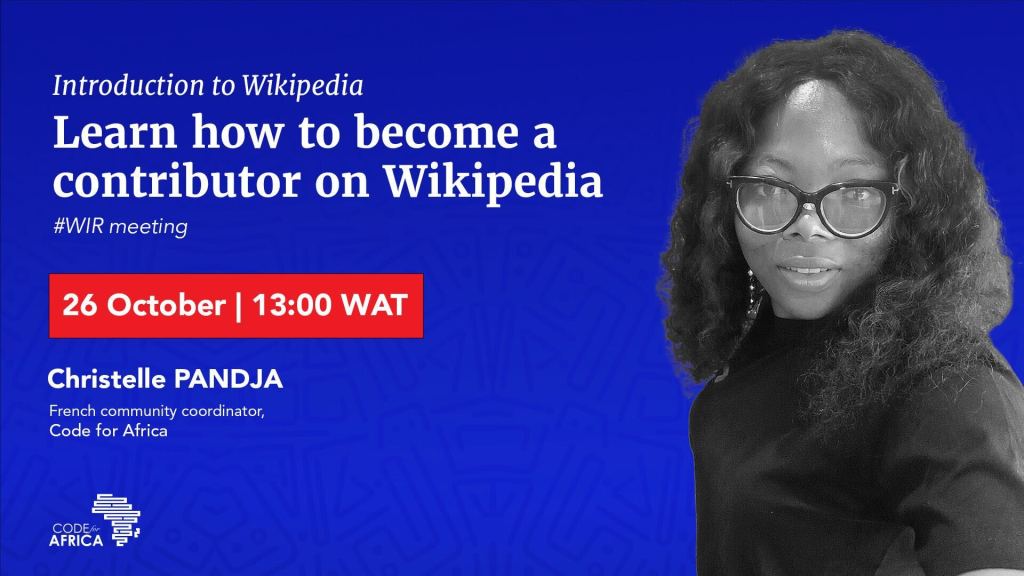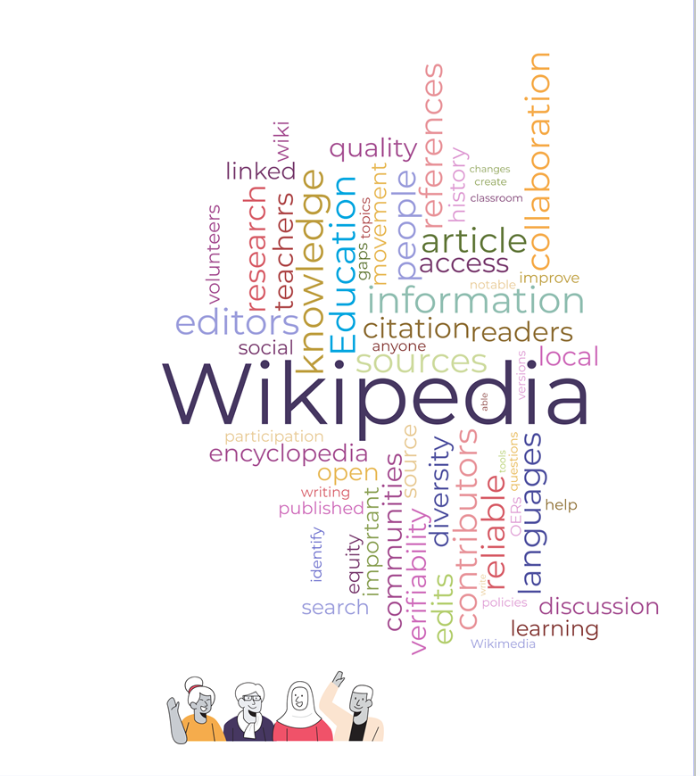
The Code for Africa (CfA) Francophone Wikipedian in Residence (WiR) community in its continued effort to empower African Wikimedians in the French Speaking community, through its monthly meetups, hosted a October edition themed : How to Edit on Wikipedia? which was led by : Christelle Pandja, Francophone Community Coordinator, co-facilitated by Bukola James, the WIR Community Coordinator, and Arame Thiam, a Data Analyst at CFA, with an active participation of 24 attendees.
Session Highlights
Christelle who was the lead Trainer Introduced the participants to the basics of Wikipedia, its principles and facts. She explained the meaning of the word Wikipedia which comes from two words “Wiki and Encyclopedia” and further elaborated on the relevance of the free knowledge web-based platform as defined on Wikipedia itself . The session was interactive and insightful.
Below is an image that illustrates the Wikipedia concepts and its relevance as highlighted below:

- Wikipedia was created on January 15, 2001 by Jimmy Wales and Larry Sanger.
- Wikipedia has over 56 million articles in over 329 languages on different Wiki pages.
- Wikipedia is not a finished project,t’s constantly evolving.
- On Wikipedia, As of October 23, 2023, the French edition contains 2,562,737 articles and has 4,775,020 contributors.
Regarding the principles of Wikipedia, we had an excellent presentation on core content policies consisting of:
The 5 pillars of Wikipedia were also discussed and they include:
- Wikipedia is an encyclopedia.
- Wikipedia is written from a neutral point of view.
- Wikipedia is free content that anyone can use, edit and distribute.
- Wikipedia editors must treat each other with respect and courtesy.
- Wikipedia has no firm rules.
Christelle further addressed the various misconceptions of non-users regarding the Wikipedia platform. Highlighting the misconceptions which are frequently stated by individuals who use the platform.These misconceptions have been said to prevent them from benefiting from the important data and sources that Wikipedia offers, which also constitutes a lack of interest among populations on the platform.
A few of these misconceptions include:
- “Wikipedia is a secondary source.” Wrong! But rather: Wikipedia is a tertiary source (reference material) whose entries come from reliable secondary sources such as newspapers, journal articles, books, among others. See the Wikipedia Library for more information on the databases consulted when editing on Wikipedia.
- “Anyone can add their opinion to Wikipedia and claim it as fact.” Wrong! But rather: Opinions are not allowed on Wikipedia. If anyone adds content that violates this rule, it will be removed by a subject expert with more than 10 years of experience as an administrator and reviewer on Wikipedia.
- To prove me wrong; try posting an article to Wikipedia today without any references and wait until you see the thousands of messages on your talk page, if you are not blocked or prohibited from editing.
- “Changes made to a Wikipedia article cannot be reversed” False! But rather: Wikipedia articles are dynamic and continually improved. New changes can be deleted or rolled back and old changes can be restored if necessary.
- “All Wikipedia articles are unreliable and unverifiable” False! But rather: Specifically, we have categories for all articles on Wikipedia, which also determine readability and usability by scholars and readers. Please visit the rating system to learn more.
- “All Wikipedia articles are subject to vandalism.” False! But rather: pages that are controversial, sensitive or prone to vandalism have been protected to varying degrees. A frequently vandalised article may be “semi-protected” or “extended confirmed protected”, meaning that only “self-confirmed” or “extended confirmed” editors can edit it. A particularly contentious article may be locked so that only administrators can make changes to it.
- “Wikipedia makes people lazy, they are more likely to commit plagiarism.” Fake! But rather: When properly presented and explained, Wikipedia allows individuals to do independent research using the encyclopedia as a starting point. This can facilitate the development of key 21st century skills that prevent students from committing plagiarism
Remarks:
Two experienced editors expressed the importance of the session as their first Wikipedia contributions were rejected because they were not aware of the Wikipedia principles and core content policies mentioned above, and they encouraged beginners to take into account the different points shared by Christelle.
Would you like to join our next event? Visit our community programs page to get started.. To stay up to date with our initiatives, kindly fill out this form, and let’s shape the future together!

Can you help us translate this article?
In order for this article to reach as many people as possible we would like your help. Can you translate this article to get the message out?
Start translation